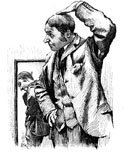
The Ideology at the Root of Our Moral Disorder
MEET SOCIOLOGICAL MAN
A few years ago, I wrote an article titled “Abolishing the Moral Order,” in which I argued against the ideology of philosophical materialism that currently inspires many researchers in neuroscience, neuropsychology, and related fields (CrisisMagazine.com, Dec. 15, 2016). These people would have us believe that man is nothing but matter, and that once you understand how his body works, there is nothing more to know about him. I tried to explain in my article why such a philosophy can’t be true. I made the unoriginal point that just because a philosophy is untrue doesn’t mean it’s necessarily unpopular or unimportant. I argued that the widespread acceptance of materialism would mean the end of our belief in free will and everything that depends on free will, including law and the moral order of society. I wrote that without free will, we are no longer dealing with human beings in a human society but with ants in an ant colony — a colony ruled by materialist philosophers. To me, it’s a deal-breaker when a philosophy is meant to apply to everyone but the philosopher himself. It’s a sure sign that we are not dealing with a philosopher at all but a tyrant pretending to be a philosopher.
Nothing I’ve seen or read since I wrote that article has changed my opinion of philosophical materialism. It remains popular, powerful, and untrue. It is one among many false philosophies, or ideologies, that have emerged, or perhaps re-emerged, in the modern world to challenge and replace the Judeo-Christian understanding of man. This traditional understanding is seen by materialists as an obstacle to progress, to man’s goal of becoming autonomous — i.e., free from all constraints other than those he chooses.
Catholic theologian Henri de Lubac, S.J., referred to these ideologies collectively as “atheist humanism,” and he identified Auguste Comte, Karl Marx, Ludwig Feuerbach, and Friedrich Nietzsche as its leading thinkers. Needless to say, atheist humanists are not our friends. They want God out of the public square — and out of the private sphere as well. They believe we would all be better off without God, so they want to create a society with no trace of God. And they seem to have a particular dislike for Christianity, and that dislike turns into hatred and bigotry the closer you get to Catholicism.
I know this because I lived among this tribe for many years, studied them carefully, and even went native for a time. But, through the grace of God, I never felt at home among them, even though 20 years ago I won an award for writing a book on Marxist sociology. To Catholics, atheist humanists are enemies. And though we should love them, our loving them does not make them our friends, or any less dangerous. So, let’s spend some time with our enemies.
You May Also Enjoy
I identify five stages in the conversion process. Individuals may spend more time in one particular stage, but the stages are more or less common to all converts.
Since the time of Martin Luther, Christianity has endured a deepening crisis, and the Western world is experiencing a chronic surge toward atheism.
When you have it you feel it is going to take you off to Rome (a sort of death for the Anglo-Catholic), but when you get better you easily forget it.

